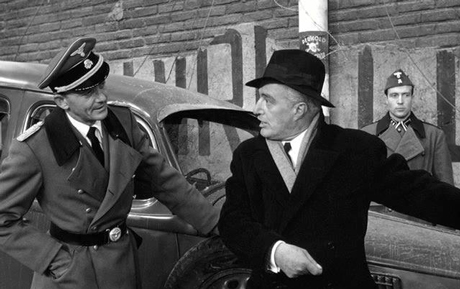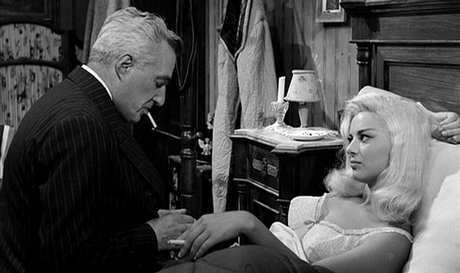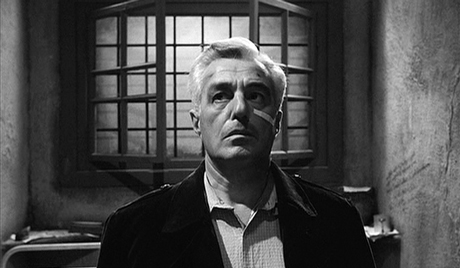|
|
By Glenn Erickson
1959's Il Generale Della Rovere is an atypical film for Roberto Rossellini. After his neo-realist beginnings and a multi-film collaboration with Ingrid Bergman, Rossellini was already turning away from feature entertainments, with a semi-documentary project filmed in India. Filmed mostly on studio sets, the film combines the wartime setting of Open City with the moral uplift of the Bergman films. The most accessible and conventional of his films, it was cultivated to be a hit, and make a strong showing at the Venice Film Festival. Actor-director Vittorio De Sica was chosen to star because he would appeal in other European countries besides France. As Rovere is so performance oriented, De Sica's creative contribution probably equals that of Rossellini.

The book by Indro Montanelli has its basis in real events. In wartime Genoa, gambler Emanuele Bardone (Vittorio De Sica) has subsisted by becoming a petty swindler, using bribes to a German staff clerk to buy the freedom of Italians suspected as partisans. Posing as a Colonel from the Great War and pretending to have real influence, Bardone overcharges the wealthy Chiara Fassio (Anne Vernon) for the promised release of her husband. He then gambles away the bribe money and tries to cover his losses by selling fake jewelry. When Bardone befriends the high-ranking German Colonel Mueller (Hannes Messemer), all of his problems seem to be over. But Mueller instead arrests the con man and gives him a choice: impersonate a dead Italian resistance organizer, the respected General Della Rovere, or be shot. Bardone finds himself in a German prison surrounded by genuine Italian heroes; to save his own life he's expected to act as a Judas and identify Rovere's contact man, the leader of the resistance.
Oddly celebrated as a return to Rossellini's roots in Italian neorealism, Il Generale Della Rovere is a tightly scripted story filmed with professional actors on studio sets. Rossellini's staging is conventional and he even uses a zoom lens in a couple of scenes. He match-cuts between his artificial settings and authentic film footage of war action and bombed streets. Yet the marvelous performances, particularly that of Vittorio De Sica, have an authenticity no 'realism' could provide.
Emanuele Bardone is a fascinating character, a reckless charlatan accustomed to lies and impersonations, fantasies that also make him feel good about himself. Posing as a WW1 veteran named "Colonel Grimaldi', he foolishly believes that he's helping the people he robs. Even with the privations of wartime Bardone manages to keep two girlfriends, the entertainer Valeria (Giovanna Ralli) and a prostitute, Olga (Sandra Milo). Olga's devotion to Emanuele is so great that she gives him money, rather than let him swindle the other girls in the brothel. Bardone is really swindling himself, thinking that he can gamble his way out of debt and square things with all the people he's harmed. He owns up to his true character only when Colonel Mueller reads his civilian rap sheet from before the war: "...thief, drug pusher...".

Forced to collaborate with the enemy, Bardone sees what conditions are like for political prisoners. Some are tortured and one commits suicide to avoid giving up information. For the first time Bardone is uncomfortable playing a 'theatrical' role. His fake general is treated as a VIP by the SS guards and their Italian stooges. He's mortified by the hurried messages he finds written on his cell walls, from men being called to be executed. The patriotic scribbles profess love for country and beg somebody to convey their feelings to their families. Bardone shouts out a patriotic speech to his fellow prisoners during an air raid -- mostly to calm his own nerves. How can he betray these men? How low can he allow himself to sink even lower?
Il Generale Della Rovere would seem a perfect role for Charles Chaplin, were the internationalist comic interested in a story about patriotism to a particular country. De Sica performs the role as would Chaplin post- Monsieur Verdoux. Both characters commit moral crimes to survive, but only the sentimental Bardone attempts to atone. De Sica had made the leading character of his own Miracle in Milan very Chaplinesque, and the Bardone character evolves from thoughtless selfishness to 'noble contrition' in much the same way a later Chaplin character might. He watches a common barber (Vittorio Caprioli) die rather than betray his country. Having assumed the role of the great General, Bardone is compelled to behave as the General would.
Anne Vernon (of The Umbrellas of Cherbourg) makes a strong impression as Bardone's most wronged victim. A real Baronessa Bazzani performs without credit as Della Rovere's wife, who comes to the prison in hopes of seeing him. The SS Colonel played by Hans Messemer (The Great Escape) is unlike the vicious monsters Rossellini portrayed years earlier in Rome Open City. Colonel Mueller expresses regret for having to force men to talk, a script detail possibly encouraged by the commercial need to avoid offending German audiences. Mueller rightfully sees Bardone as an ideal chameleon to impersonate the near-legendary General; but doesn't take into account Bardone's capacity for patriotic feeling.

Roberto Rossellini's direction is always good for character. Many scenes are done in long takes, usually with camera motion. A roundup of prisoners near the end seems slow, as every faction represented (Communists, Jews, random arrestees) have their say. But an earlier scene in which Bardone is forced to face the sad people he has fleeced is better, mainly because De Sica has the floor and does most of the talking. Like Chaplin in Monsieur Verdoux, Rossellini purposely eschews emotional effects for his strongest scenes. The grim finish plays out in a wide shot. Rossellini made only a few more films before shifting over to a series of TV docudramas and miniseries, often about historical figures. His next picture Era notte a Roma (Escape by Night) is another story of the German occupation that reunited actors Giovanna Ralli and Hannes Messemer.
Raro Video's Remastered Edition Blu-ray of Il Generale Della Rovere reflects an Italian restoration done several years ago, and a different transfer than Criterion's earlier DVD from 2009. Setting this release apart is the inclusion of the restored cut of the version Rossellini screened at Venice in 1959. It is six minutes longer than the 132-minute theatrical cut, which is included as an extra.
The transfer is excellent in quality, with only the restored sections having more film grain; they were apparently taken from a surviving print. More puzzling is the flat aspect ratio, which is maintained at 1.33:1 for both versions, although the layout of the main titles and cameraman Carlo Carlini's compositions clearly point to a wider aspect ratio being correct. Even more curious is the fact that the entire frame has been scanned, resulting in a slightly window-boxed image that reveals the full camera gate, with bits of dirt clinging to the extremes of the image. The presentation would be much more focused had the unnecessary real estate below and above cropped away. Those prison cells have very high ceilings.
Raro's extras are also different from those on the Criterion disc. A long video essay (45 minutes) contains interview material with Roberto Rossellini's son Renzo and critic Adriano Aprá; the critic returns for more analysis of Rovere's mix of realism and artifice. A separate interview with Renzo Rossellini includes material used in the video essay. The original Italian trailer uses no scenes from the movie. It instead shows De Sica and Rossellini at the Venice Film Festival, where the director is seen accepting the Golden Lion award. Actor Hans Messemer also won a special mention for his performance.
On a scale of Excellent, Good, Fair, and Poor,
Il Generale Della Rovere Blu-ray rates:
Movie: Excellent
Video: Excellent
Sound: Excellent
Supplements: Interviews with Adriano Apra, Renzo Rossellini, Aldo Strappini; Video Essay; Trailer, ENTIRE THEATRICAL VERSION (132 minutes), booklet.
Deaf and Hearing Impaired Friendly?
YES; Subtitles: English
Packaging: Keep case
Reviewed: November 24, 2013

DVD Savant Text © Copyright 2013 Glenn Erickson
See more exclusive reviews on the Savant Main Page.
Reviews on the Savant main site have additional credits information and are often updated and annotated with reader input and graphics.
Also, don't forget the
2011 Savant Wish List.
T'was Ever Thus.
Return to Top of Page
|

